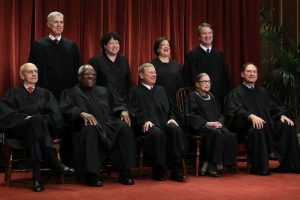Unfortunately, Public Faith In Our Courts Deserves To Be This Low
With an imbalanced federal judiciary primarily made up of former government advocates often pursuing political agendas, is it any wonder that public trust in our legal institutions exists at all-time lows?

(Photo by Chip Somodevilla/Getty Images)
One of my favorite legal columns is authored by Linda Greenhouse at the New York Times. Last week, she issued a fascinating piece detailing a United States Supreme Court in crisis. In Greenhouse’s view the crisis is due to the fact that the nine justices seem more concerned with advancing political agendas than settling the legal disputes in front of them. To be sure, the argument that our Supreme Court operates more out of a concern for political partisanship than by application of the law is nothing new. But Greenhouse makes a unique argument that this modern Court has distinguished itself by its “inability to provide a coherent answer” to the questions it chooses to take on. In other words, Greenhouse is pointing out that although past Supreme Courts have been partisan, they at least provided clear legal doctrines to follow, unlike this current one. Sadly, these sorts of partisanship-based problems are not limited to our Supreme Court.
A couple of weeks ago I wrote about how federal district judge Justin Walker issued an ex parte temporary restraining order against the mayor of Louisville. As others beside myself have observed, this 86-footnote-long order included a drawn out and completely irrelevant diatribe of religious grievance and victimhood. Even more remarkable is that, as it turns out, the order itself was completely unnecessary. Absent a real case or controversy, the reason behind the order can logically be traced to the fact that the federal judge issuing it is being considered for promotion. Meaning that such theatrics were likely intended to bolster his political support. Outside of helping Walker’s career however, the effect of such blatantly political-based orders is profoundly damaging to the legitimacy of our courts.

Legal AI: 3 Steps Law Firms Should Take Now
Think about it, how on Earth can any future party going before Walker on a case regarding religious liberty ever expect to have a fair hearing? Of course, if you are a conservative Christian you can expect Walker (and the law in general) to be biased in your favor to the great expense of everyone else, particularly nonbelievers. Regardless of whether such bias is working for or against you, however, it certainly erodes the courts’ legitimacy as neutral arbitrators. Worse still, a lot of evidence suggests the clear bias of the federal judiciary extends well beyond judge Walker and the subject matter of religion.
In a study conducted by Clark Neily at the CATO Institute, the professional background of every sitting federal judge was examined. What was discovered should be concerning to everyone. Neily found that “a disproportionate number of federal judges served as government lawyers before donning a robe.” Just how disproportionate? When it comes to former prosecutors as opposed to former criminal defense attorneys the ratio is 4 to 1, but when you expand the parameters to include “judges who previously served as courtroom advocates for government in civil cases” the ratio becomes 7 to 1. The negative impact this imbalance has on the perception of our courts is substantial, according to Neily:
“The radical imbalance between former government advocates and former government opponents on the federal judiciary is particularly concerning when we consider what federal judges actually do, as well as the key role of the judiciary in our system of government. While the bulk of the federal court docket involves disputes between private parties, around 20 percent of all federal cases are criminal prosecutions, with another 15 percent involving various challenges to government power, including civil rights cases and habeas corpus petitions. Some of these are literally a matter of life and death — and not just in capital cases — whereas others involve constitutional challenges to laws that restrict people’s ability to work, speak, worship, travel, get married, or raise their own children. Other cases involve fundamental questions regarding the size, scope, and nature of government power, including the legitimacy of our ever‐expanding, increasingly unaccountable federal bureaucracy. If a person’s last job before judging the legality of that bureaucracy was representing its interests in court, who could fault the civil rights plaintiff for suspecting that the agency she’s suing might enjoy a bit of a hometown advantage?
As demonstrated above, when criminal and civil rights cases pitting individuals against government are filed in federal court, the chances are nearly 50 percent that they will be heard by a judge who served as a courtroom advocate for the government (but never for individuals against government), whereas there is only a 6 percent chance that the case will be heard by a judge who represented individuals in cases against the government (and never served as an advocate for government). No prosecutor would relish the prospect of trying a case before a jury half‐filled with former criminal defense attorneys — just as no criminal defendant relishes the idea of going before a judiciary half‐filled with former government advocates. But for now at least, that’s the system we have.”
Sponsored

Early Adopters Of Legal AI Gaining Competitive Edge In Marketplace

Legal AI: 3 Steps Law Firms Should Take Now

The Business Case For AI At Your Law Firm


Early Adopters Of Legal AI Gaining Competitive Edge In Marketplace
Combine all this blatant partisanship and professional imbalance and what do you get? You get a federal judiciary facing a legitimacy crisis more serious than at any other point in modern history.
Given that both Republican and Democratic administrations contributed to the current imbalance, engaging in a partisan blame game is probably the worst — or perhaps the most useless — thing we can do right now. What’s needed is a modern commitment to rectifying this imbalance and bias. Of course, given our current state of extreme polarization this might seem impossible. Therefore, I will end with some good news in the form of recent data that demonstrates, as a whole, the country is steadily moving away from the exclusionary concepts of American identity that have led to our current divide. The great hope therefore, is that although this crisis is well earned, our incoming generations have a chance to make it only temporary.
 Tyler Broker’s work has been published in the Gonzaga Law Review, the Albany Law Review, and is forthcoming in the University of Memphis Law Review. Feel free to email him or follow him on Twitter to discuss his column.
Tyler Broker’s work has been published in the Gonzaga Law Review, the Albany Law Review, and is forthcoming in the University of Memphis Law Review. Feel free to email him or follow him on Twitter to discuss his column.
Sponsored

Is The Future Of Law Distributed? Lessons From The Tech Adoption Curve








